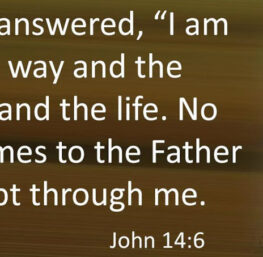 by Mark Driscoll –
by Mark Driscoll –
The Old Tolerance vs. the New Tolerance
The old view of tolerance assumed that (1) there is objective truth that can be known; (2) various people, groups and perspectives each think they know what that objective truth is and (3) as people/groups disagree, dialogue and debate their conflicting views of the truth, everyone involved will have an opportunity to learn, grow, change and possibly arrive together at the truth.
The new tolerance is different from the old tolerance. The new view of tolerance assumes that (1) there is no objective truth that can be known; (2) various people, groups and perspectives do not have the truth but only what they believe to be the truth and (3) various people, groups and perspectives should not argue and debate their disagreements because there is no truth to be discovered, and to assume otherwise only leads to needless conflicts and prejudices.
the new tolerance denies moral absolutes while holding to the moral absolute that there is no moral absolute
Absolutely No Absolutes
A few things are perhaps most curious about the new tolerance. One, it denies moral absolutes while holding to the moral absolute that there is no moral absolute. I know that’s confusing. It’s like saying, “There is no such thing as absolute truth”—to which the question should be asked, “So does that mean you’re lying when you want us to believe your absolute statement that truth does not exist?” You cannot say absolutely that there are no absolutes. I hope you see that the statement itself saws off the very limb it’s sitting on.
Two, the new tolerance is dreadfully intolerant. Ask average people arguing that every moral view is equally valid and respectable whether they think it’s right for big corporations to destroy the planet, that women at one time could not vote or that people once smoked on airplanes, and see if they are willing to truly welcome, embrace, celebrate and tolerate everyone and everything.
the new tolerance is dreadfully intolerant
I’m pretty sure if an old guy smoking a cigarette while buying stocks in oil companies and gun makers and bemoaning it was a big mistake to let women learn to read was sitting on a plane next to a feminist on staff with Greenpeace, she would not defend his equally wise and welcomed alternative lifestyle to the flight attendant who was being intolerant for asking him to put out his cigarette.
Morality as Wine Tasting
Today morality is more like wine tasting than banking. In banking, there is a right and wrong answer. If you deposit $1,000 in a new bank account and a week later try to withdraw $80, you would not be willing to agree to disagree when the teller says your account is empty.
But we don’t see morality like banking anymore. Instead, we see it more like wine tasting. In wine tasting, everyone has their favorite blends and no one is necessarily right or wrong—it all depends on individual palates. No one has the right to declare as an absolute truth that simply because they prefer a specific grape or vintage, it is superior to all other wines.
The problem is, the God of the Bible sees morality like banking, not wine tasting. This is why Jesus referred to sins as “debts” in the world’s most famous prayer (Matt. 6:12).
Today there are not sins. There is only one sin, and that is calling anything a sin.
HT: Excerpts from Charisma Media article.




I’m quite shocked to see anything authored by Mark Driscoll posted by a site that calls itself Orthodox. Mark Driscoll is at the very least a misguided follower of Reformed tradition, if not the face of one of today’s most frightening cults of personality.
“The problem is, the God of the Bible sees morality like banking, not wine tasting.” This statement is an outgrowth of the Reformed idea of penal substitution, which is completely incompatible with Eastern Orthodox theology. I’m sure Saint Athanasius would take umbrage with this viewpoint being espoused as in any way relating to Orthodoxy.